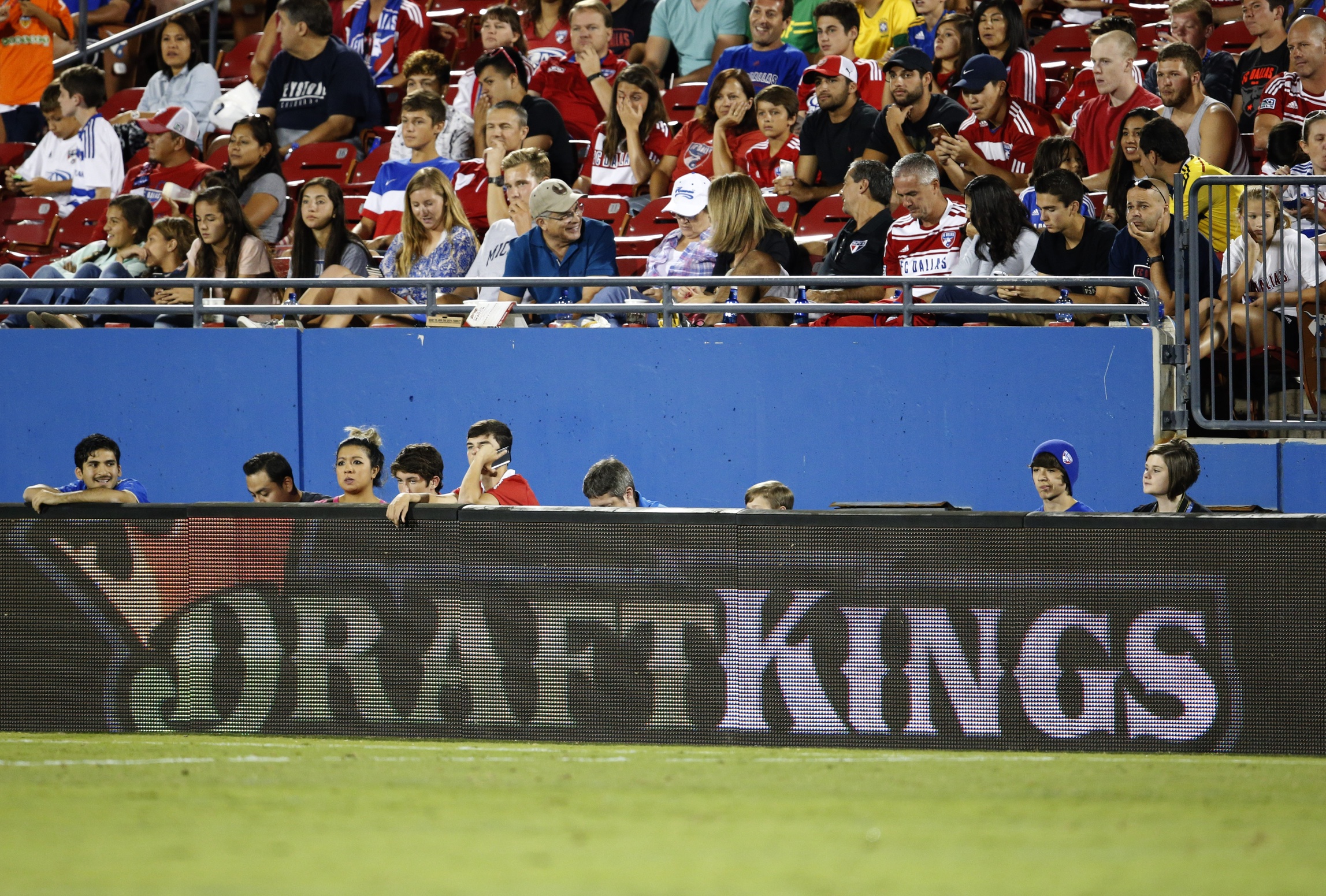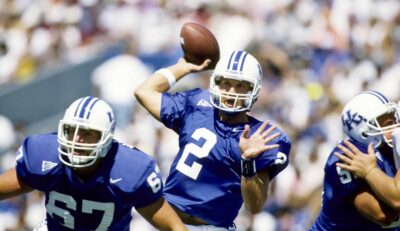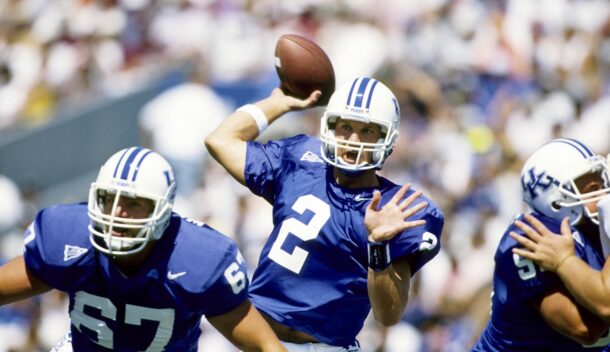
While the popularity of fantasy football is booming, that boom doesn’t seem to be reaching the college ranks.
In March, FanDuel and DraftKings, in an agreement with the NCAA, announced they were no longer offering college football games, effectively killing daily college fantasy football play.
It’s still possible to play seasonal fantasy football with college players, as most seasonal programs can be played, if desired for free, but the amount of online offerings are slim.
WHATEVER HAPPENED TO DAILY COLLEGE FANTASY FOOTBALL?
It fell victim to the debate over whether or not daily fantasy sports are games of chance or skill.
For years, the NCAA has tried to limit gambling on their games, be it by an attempt to take games off the Las Vegas books 10 years ago or by banning players who shave points or by prohibiting participants from playing fantasy sports games themselves.
It is hardly surprising, therefore, the NCAA took a dim view of the daily fantasy sports explosion.
“The NCAA kind of came after us,” said Emily Bass, the public relations manager of FanDuel. “We will voluntarily suspend the contest in all states. We really had conversations with the NCAA for months.”
“We make decisions as a business that benefits our long-term strategy. We don’t want to make any enemies.”
But despite growing rapidly in participation over the years, college football and basketball accounted for only three percent of FanDuel’s market. And if FanDuel and DraftKings didn’t provide college offerings, then they wouldn’t have to worry about the NCAA opposing them under the Professional and Amateur Sports Protection Act.
Also known as the Bradley Act after its main sponsor, Sen. Bill Bradley, the Hall of Fame basketball player for Princeton and the New York Knicks, the law prohibits states not already offering gambling on sports (such as Nevada) from doing so.
And with the slippery slope of whether or not Daily Fantasy Sports constitutes gambling or not, and with the states of Massachusetts and Indiana already banning DFS games featuring colleges, it’s thought FanDuel and DraftKings just don’t think it’s worth enduring the NCAA’s wrath in the current climate for such a small piece of their business.
There is some talk of how much longer the Bradley Act will be in effect. NBA Commissioner Adam Silver, for instance, has openly discussed allowing more legal wagering on professional basketball. The Bradley Act essentially prohibits this.
But whether it stays or goes in the future, for now, the two leading entities providing daily fantasy sports games are no longer offering them with college football.
“College and pro games and players are not the same. Collegiate athletes live among and are readily accessible to their fan base and the general public,” Maureen Riehl, the executive director of the Student Sports Protection Alliance, said in an email. The organization is a lobbying organization designed to “protect college, high school, and youth athletes and the integrity of the sports they play.”
“College athletes are already prohibited from engaging in regular gambling; for collegiate athletes to be the subject of gaming (even fantasy sports) could potentially grossly affect the integrity of collegiate games, jeopardize their eligibility to play, and subject these athletes to unfair pressure or undue influence because of their accessibility, susceptibility, or lack of knowledge or financial resources to say ‘no.'”
“I don’t know when the corruption comes in by a fantasy player having a bad game or injury, unlike point shaving,” said Joe DiSalvo, who runs The College Fantasy Football Site (theCFFsite.com), a guide for college football fantasy players.
For a variety of factors — advertising, payouts, ease of play — daily fantasy games seem to have overtaken seasonal games.
But it is here where college fantasy football is still played.
SEASONAL COLLEGE FOOTBALL GAMES
DiSalvo has been playing college fantasy football for 20 years, when players kept track of their stats and leagues with notebooks and calculators instead of computer systems.
“I do so much research I decided to start a site of my own,” he said.
But think, when you listen to the fantasy football expert on sports talk radio take calls or discuss players, it’s always about the NFL, not the college game.
The seasonal fantasy football games are not under legal scrutiny because most programs do not deal in payouts. For instance, a person could join a fantasy football league online for free and play for fun. Banning this would be akin to banning playing cards.
But many sites that offer NFL seasonal fantasy football do not offer it to the college ranks. DiSalvo links only two sites that offer college fantasy football games on his website.
The reason? DiSalvo thinks it’s because college fantasy football requires more effort to play.
After all, it’s one thing to have a working knowledge of the ball-handlers of the 32 pro teams. It’s another entirely to keep track of 128 colleges.
“Once the Mannings and Brees get in, you know them,” DiSalvo said. “In college, there’s too much turnover, too many teams, too many players.”
However, this is what makes being in the cult of college fantasy football players so much fun.
“There was an edge in college because the players were more unknown. It’s all about matchups. There are huge edges and mismatches in college that’s appealing to some but not others.”
College fantasy football is played with the same rules and point systems that the pro game is. Chad Kelly could be traded for Joshua Dobbs in college fantasy football, and players can be dropped and added as well.
Which may be another turnoff to playing college fantasy football. Trades and cuts are a way of life in the NFL, but culturally it takes some getting used to with college players.
However, based on the feedback DiSalvo has received from his site, he surprisingly states that most college fantasy football players are like him, intrigued by the aspect of following all of Division I and not just living and dying with a single conference, such as the SEC.
“We run polls on our website,” he says. “Fifty percent who play full FBS. Forty percent play the Power 5 conferences with Notre Dame and BYU thrown in. Ten percent play conference specific.”
It speaks of the reason the appeal of college fantasy football might be limited. The typical passionate SEC fan may know all 22 starters of his own team, but does he really know who the third receiver at Missouri is? The college fantasy football game is more about finding out who is playing an FCS team or making sure to pick Georgia Tech’s feature back when the Yellow Jackets play a team with a weak run defense.
“What they love is their research allows them to do well,” DiSalvo said. “I will speak for the whole community. A guy who plays college fantasy and puts him in pro will do okay. You take a guy who plays pro and put him in college, he’ll struggle.”







